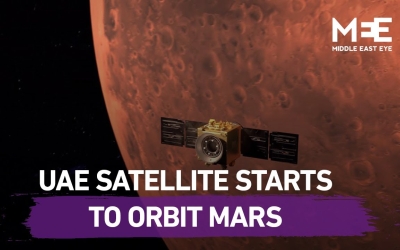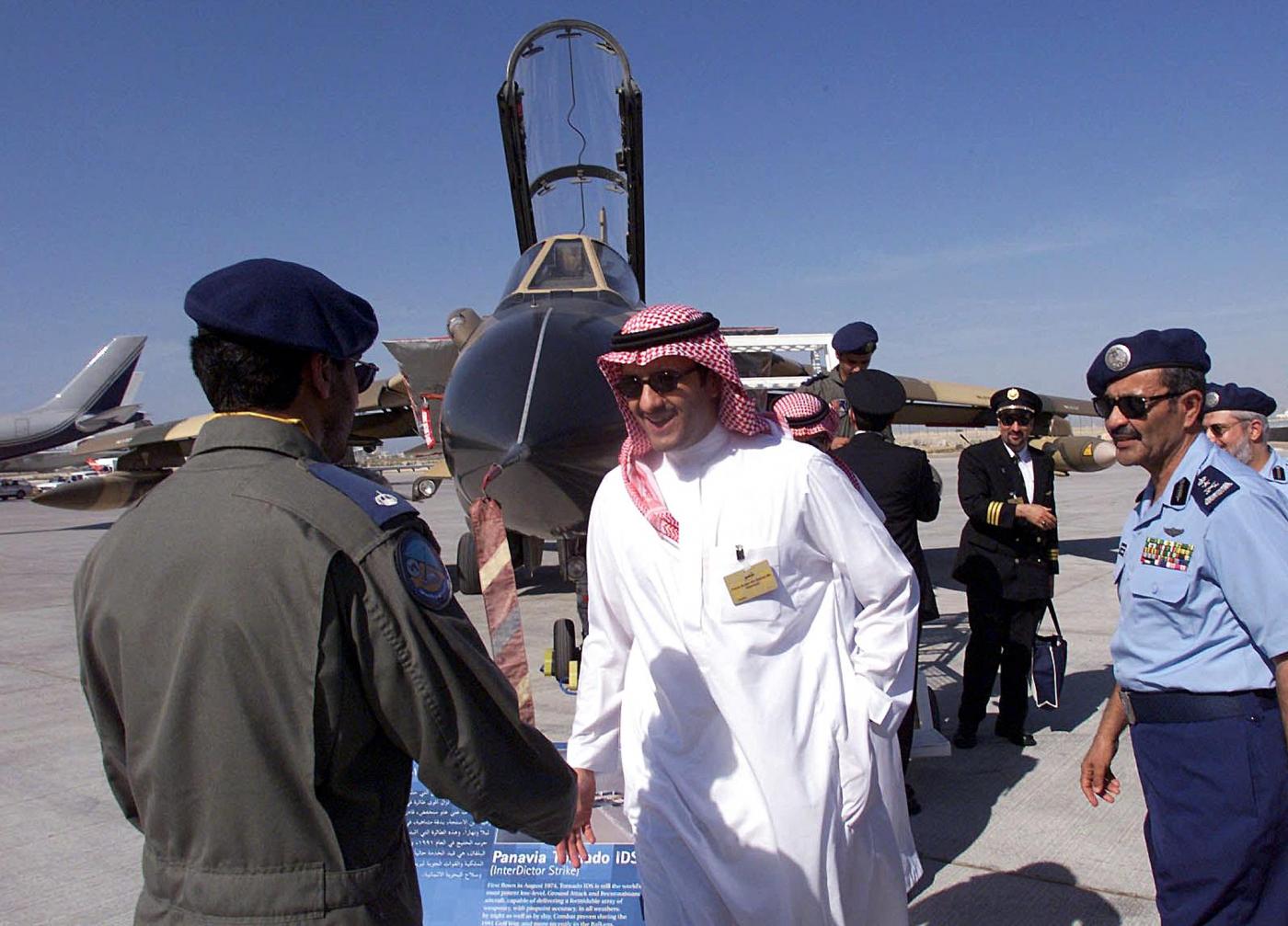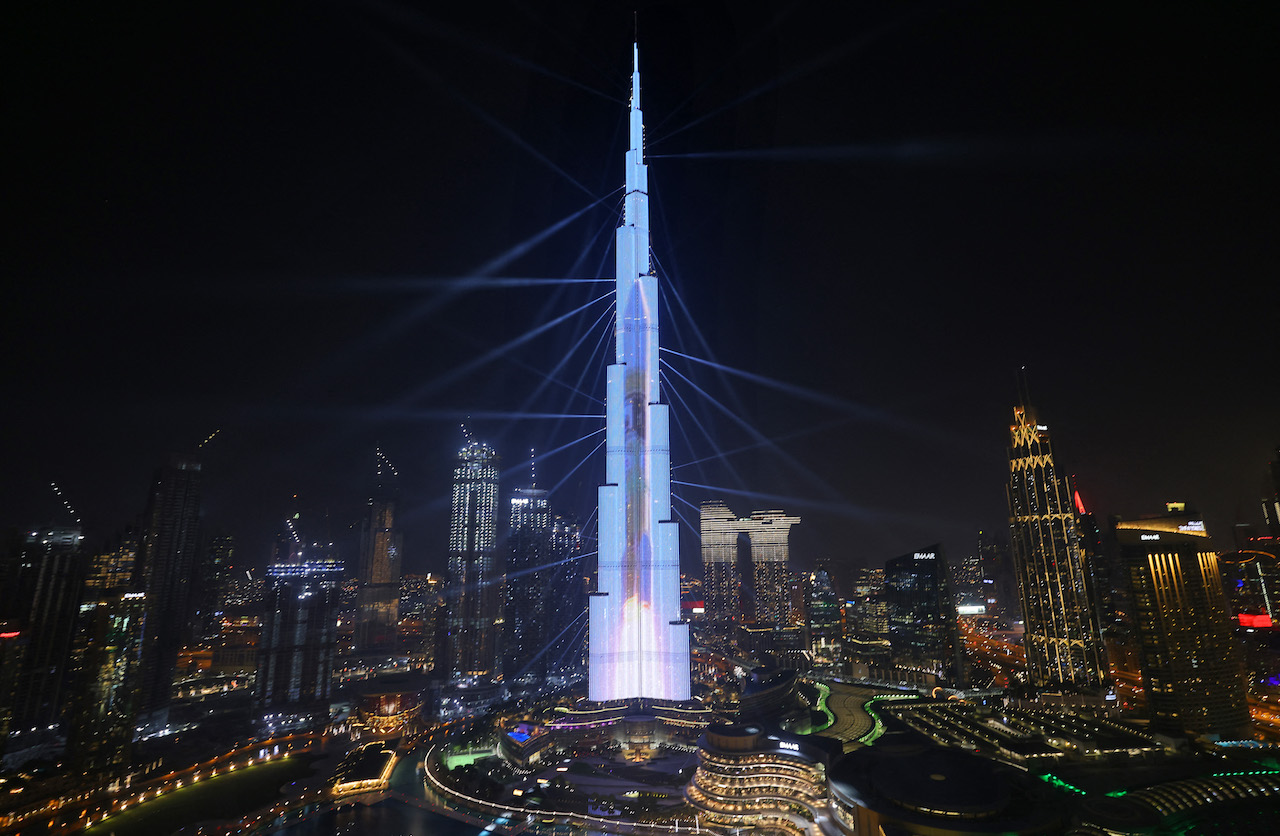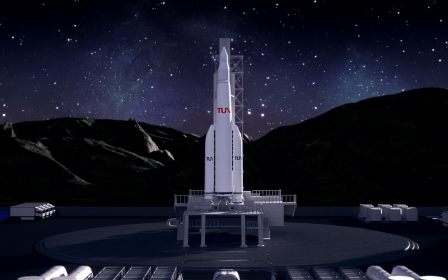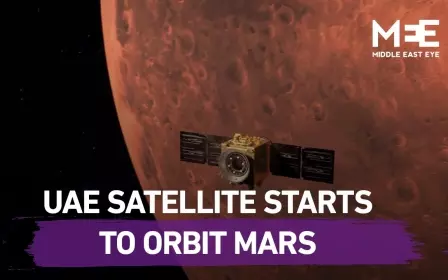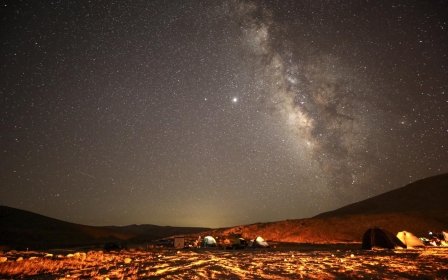'Investment and ambition': A history of Middle Eastern space exploration
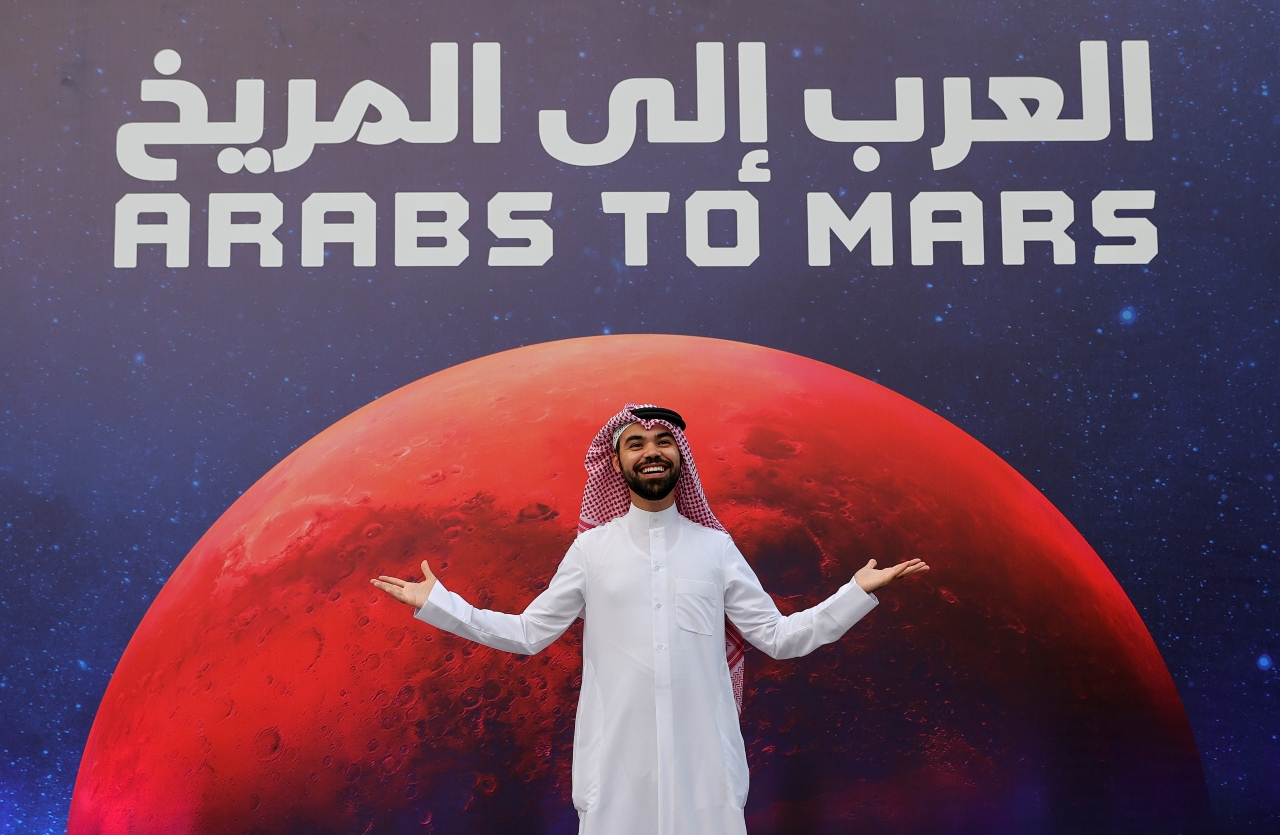
Earlier this month, the United Arab Emirates (UAE) became the first Middle East country to successfully send a spacecraft into orbit around Mars and only the fifth country to do so.
The Amal probe, or "Hope" in English, was launched on 19 July 2020 and reached the Red Planet on 9 February. It carries three instruments that will be able to understand the Martian atmosphere.
On Monday, it beamed back its first picture of the planet, a product of the UAE's rapid entrance into the space sector in recent years.
Amal's success has helped rekindle memories of space programmes developed by other countries in the region.
Over half of the countries in the MENA (Middle East and Africa) region have, or have had, government space programme.
"While the UAE has positioned itself as the regional leader in space, other countries are also increasing their level of investment and ambition in space programmes," said Simon Seminari, principal adviser at Euroconsult, a consulting firm specialising in space markets.
Space spending in the MENA region has nearly doubled in the past decade, from a total of $755m in 2010 to nearly $1.3bn in 2020, according to Euroconsult's market intelligence report on government space programmes.
Hidden rocket programmes
The roots of modern space exploration in the region date back to the early 1960s.
"In the Middle East, fascination with space exploration is a phenomenon of post-World War II," said Dr Jorg Matthias Determann, associate professor of history, science, technology and society at Virginia Commonwealth University School of the Arts in Qatar.
Determann recounts how Egyptian president Gamal Abdel Nasser began to develop a national space programme in the early 1960s with the help of German expertise but which was shelved as a result of the 1967 war with Israel.
Despite that setback, Egypt has set a record in North Africa over the past three decades, launching nine satellites into space, with the main purpose of communication and TV broadcasting.
The African Union decided to create a space agency in 2017 headquartered in Egypt, which is supposed to be up and running in 2023.
"Conflicts in the Middle East encouraged countries in the region to invest in defence and rocket developments to get a qualitative edge over their neighbours," said Determann.
"Space programmes are also useful because they can hide rocket programmes and give them another form of legitimacy."
Commemorative postage stamp
The success of space initiatives in the Middle East has varied in recent years as various countries have each shown a new dynamism and interest in the subject.
One of the first scientific experiments for space exploration in the Middle East was conducted in Lebanon from 1960 until 1964.
The country hosted the first civilian space programme thanks to a group of students from Beirut's Haigazian College who established a rocket society for scientific purposes.
Led by Professor Manoug Manougian, the Haigazian College Rocket Society (HCRS) launched several rockets during the period. Following the first launch, the Lebanese army cooperated with the HCRS.
"Every rocket launch was an event in Lebanon. It became a national phenomenon," said Mira Yardemian, public relations director at Haigazian University
"In 1963, around 15,000 people attended the launch of Cedar rocket IV, which reached a 140km altitude."
Lebanon even commemorated the event with a postage stamp.
But when Professor Manougian returned to the United States, the project ended, with the Lebanese army wanting to develop rockets for military purposes and both Manougian and the Haigazian College preferring to stick to scientific research.
First Arab in space
To see the first Arab in space, the Middle East had to wait until 1985.
Saudi Prince Sultan bin Salman bin Abdulaziz Al Saud became the first Arab to fly in space thanks to Nasa's Space Shuttle programme Discovery in 1985.
Saudi Arabia also became the main shareholder of the Arab Satellite Communications Organisation, also known as Arabsat, a communications satellite operator created to deliver satellite-based, public and private telecommunications services to its 21 member countries.
The kingdom's interest in space exploration was reignited in 2018, with the appointment of Prince Sultan as the chairman of the Saudi Space Commission.
Saudi Arabia has said it is plans to invest $2.1bn in its space programme by 2030.
'In outer space everything is different'
Syrian military aviator Mohammed al-Fares became the second Arab in space two years after Prince Sultan.
In the 1980s, Syria sent Fares to the Soviet Union, from where he eventually flew as a research cosmonaut in the Interkosmos programme to the Mir space station in July 1987, spending almost eight days in space.
'When I was in space, I saw life from a different perspective because when you are in outer space everything is different'
- Mohammed Al-Fares, Syrian cosmonaut
"I went through 13 scientific experiments and conducted physical and chemical tests," said Fares.
"Also, I took some pictures of Earth from space to see the impact of air and water pollution.
"Furthermore, I had a machine built in Syria to study the different layers of the Earth sky up to 200km altitude."
Fares was awarded the title Hero of the Soviet Union on 30 July 1987. He was also given the Order of Lenin.
"When I was in space, I saw life from a different perspective because when you are in outer space everything is different," said Fares.
"Your body feels it is in an abnormal condition. But when I came back from space, I felt I had more empathy. I felt that Earth was like my mother. And we have to save it."
'Mossad' assassination
Like Egypt, another country that had to stop its space programme due to political turmoil in the region was former president Saddam Hussein’s Iraq.
Iraq's space programme lasted from 1988 until 1990 when it developed a solar-powered satellite, named Al-Ta'ir (Bird). In 1989, it launched a 25-metre-long rocket from a launchpad near Baghdad.
The following year it planned a second launch test named Al Kharief (Autumn), but the August 1990 Iraqi invasion of Kuwait led to the suspension of all activities.
In 1988, Saddam had commissioned a space gun from the Canadian inventor and leading artillery expert Gerald Bull, who received a $25m down-payment. The Babylon Project was designed to produce a cannon aimed at shooting satellites into orbit.
Although he was able to deliver a shorter prototype of the cannon, named Baby Babylon, the project was halted following Bull's assassination in 1990, a killing attributed to Israeli intelligence.
With rocketry developments clearly having potential for non-peaceful applications, Iran's space programme, established in 2003, has been criticised by the US and Europe because of its military potential.
Iran has launched four research satellites and tested two space rockets, while claiming in 2013 that it had sent a monkey into space.
Israeli crash
Unlike other countries in the region, Israel is one of the seven countries that have built satellites and launchers on their own.
The Israeli National Committee for Space Research (NCSR) was established by the government in 1960, and a space agency was formed in 1983. The agency, which develops satellites for reconnaissance and commercial purposes, is working on several projects, including space research.
Besides the national agency, the privately funded Israeli organization SpaceIL launched a lander named Beresheet that entered the moon's orbit on 4 April 2019. A week later, during its landing procedure, communications were lost with Beresheet, and the lander crashed on the moon.
Now, with the this month's Mars mission success, the eyes of the global space industry are firmly on the United Arab Emirates Space Agency (UAESA), which was established in 2014.
Its scientists will study Martian weather cycles, weather events in the lower atmosphere, and provide information about atmospheric hydrogen and oxygen loss and other possible reasons that have led to radical climate changes on Mars.
The agency, which has garnered about $5.2bn of funding from government, private and semi-private entities, also aims to send a compact lunar rover, dubbed Rashid, to study the moon in 2024.
Other countries in the region are developing research and space programmes, including Turkey, which this month announced a 10-year programme that includes a mission to the moon by 2023. The first stage of the mission would be "through international cooperation," while the second stage would utilize Turkish rockets, President Recep Tayyip Erdogan said on 9 February.
Countries in the Middle East have launched more than 20 satellites in the past few years, with many more in the planning phases. Oman aims to launch its first satellite in 2024.
Meanwhile, Euroconsult's Seminari said the new race for space propelled in recent years by western space agencies and private companies such as Elon Musk's SpaceX has had a positive impact on countries in the Middle East.
"There are many reasons which help explain this interest and dynamism, amongst which includes the desire to reduce reliance on oil and gas resources and diversify the economy," said Seminari.
Inspiring the young
The success of the UAE space programme seems to have boosted enthusiasm for investing in space and experts expect the strong dynamism of the Middle East in space to continue.
Seminari said there is also continuing hype in the commercial space economy, which Euroconsult valued at more than $300bn in 2020.
"Investments by governments in space can increase business opportunities, and foster innovation, technological developments, and the creation of startups and businesses," said Seminari.
Such interest in space may also inspire young people to gain degrees in several fields, including science, engineering, maths and technology, raising the overall human capacity of the country's population.
However, Determann said that international cooperation is essential for a successful space programme.
"What is still lacking in the region is the international expertise, which is hugely needed," he said.
"Even a country like the United States needs foreign expertise to develop its space programme. The Emirates Mars mission needed American expertise."
In terms of scientific research, former Syrian astronaut Fares thinks that any discovery outside Earth will be useful for humanity.
"I hope the UAE Mars mission will come back with positive results and that they will find something beneficial for Earth," he said.
Middle East Eye delivers independent and unrivalled coverage and analysis of the Middle East, North Africa and beyond. To learn more about republishing this content and the associated fees, please fill out this form. More about MEE can be found here.


